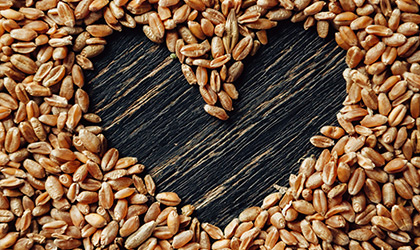
It’s 1 am. You’ve been tossing and turning for the past two hours. And you’ve got an important meeting tomorrow that you just can’t be tired for. Frustrated? You’re not alone. According to a study published by the UK’s Mental Health Foundation, nearly a third of Britons suffer from insomnia i. But, as we all know, proper sleep is a sacred pillar of health. It’s needed for everything from weight management and productivity, to emotional wellbeing and immune function. And when it’s compromised, it’s not just energy levels that suffer – every aspect of life suffers, too. So how can you ensure quality slumber is on the cards 7-days a week? Help is at hand. Using holistic methods, relaxation techniques and distraction exercises, you can unwind and get that good night’s kip you’ve been dreaming about.
Digital detox
We’re living in the era of Instagram, Netflix and online shopping. The eagle eye of technology is 24/7 and 360 degree, making it somewhat challenging to switch off (literally). But all that late-night social media scrolling could actually be interfering with your sleep. Using your phone, laptop, TV and other electronics before going to bed suppresses the release of your sleep-inducing hormone, melatonin ii. Typically, this is down to the artificial blue light emitted from these devices, along with their often-stimulating content – be it a Facebook ‘like’, a gripping film plot, or a strongly worded email from your boss. The solution: a digital detox. Initiate a curfew two hours, one hour or 30 minutes before bed. The earlier the better, but do whatever feels realistic. One substitution for screens is good, old-fashioned reading under a lamplight. Remember that?
Cut the caffeine
But first, coffee. It’s true: groggy and bleary-eyed, caffeine is what many of us turn to wake up in the mornings. After all, that cuppa java is a stimulant, making you feel more alert, energised and ready to take on the day. Problem is, caffeine can wreak havoc with your sleep if consumed too late in the day. In 2013, a study found that subjects who were given roughly 4 cups of coffee, anywhere from 0-6 hours before bed, experienced sleep disturbances iii. Don’t worry, though, you can still have your cappuccino and drink it, just avoid caffeine after 2 pm. Need a hot beverage to get you through the four o’clock slump? Choose herbal tea or decaf coffee instead.
Get moving
While there’s no magic bullet cure to solve sleep problems, a raft of scientific research suggests exercise can improve both the quality and quantity of your slumber. And no wonder; it reduces stress, lifts mood, and tires the body. In a study published by the Sleep Medicine, experts discovered a compelling link between physical activity and sleep in a group of adults over 55 years old iv. The participants were divided into two groups: one group maintained a sedentary lifestyle, while the other group started an exercise routine that included 30-minutes sessions of moderate aerobic exercise, 3-4 times per week. After 16 weeks, the exercise group demonstrated a marked increase in their sleep quantity and quality. They reported an improvement in mood and a reduction in daytime sleepiness, too. Sticking to a regular exercise routine is the best way to see the long-term benefits on sleep. Slow and steady wins the race, as the old adage goes.
A quick word on exercising before bed; common sense would suggest the combined effects of physical activity – higher body temperature, elevated adrenaline, and increased heart rate – are an explosive combination when it comes to sleep. But according to UnderstandingSleep.org, this generally varies from individual to individual v. As a rule of thumb, try to give yourself an hour to cool down before bed – the time it takes for your body to fully recuperate after exercise.
Nutrition hacks
Catching those all-important z’s could be as easy as fine-tuning your diet. Munching on magnesium-rich foods, like banana, pumpkin seeds and figs, is one way to send you into dreamland. Otherwise known as ‘nature’s tranquilliser’, this mighty mineral helps to activate the neurotransmitters responsible for soothing the body and mind, and thereby prepare you for sleep vi. Eating food high in tryptophan can also work wonders. When the body metabolises tryptophan, it turns into serotonin and melatonin – two of the main chemicals that help you doze off vii. Quick wins include turkey, oats, milk and yoghurt. Oh, and avoid those sneaky energizers, too. Sugar, alcohol, fast food and cheese (yup, the old-wives tale about eating cheese before bed is true; it contains tyramine, which is known to trigger alertness) are notorious sleep thieves, so stay away from them before you hit the hay.
Another weapon in your arsenal? Valerian root. This traditional herbal remedy is used for the temporary relief of sleep disturbances and mild anxiety. So if you want to into a natural, restorative slumber, consider adding this herbal hero to your diet.
Create a sleep sanctuary
Keeping your bedroom dark, quiet and temperate is the key to creating the perfect slumber sanctuary. Darkness is especially important as it signals the brain to produce melatonin, your sleep hormone. The National Sleep Foundation proposes 18 degrees is the ultimate sleep-friendly temperature viii. Another helpful tip: hide your alarm clock. Incessantly checking the time will only intensify your anxiety and make it much harder to fall asleep. Do yourself a favour and put it away. Out of sight, out of mind.
Establish a bedroom ritual
Humans respond well to routine – and it’s no different where sleep is concerned. Establish healthy bedtime rituals and stick to them. It could be brushing your teeth, listening to a podcast, practising a yoga sequence, or having a relaxing bath. (Added bonus: yoga and hot baths are incredibly soothing and will help to prepare your body for rest.) Make a point of going to bed and waking up at the same time every day, too – even at weekends, if you can. Following a set routine means you’ll be less vulnerable to experiencing those unpredictable, anxious thoughts just before you doze off.
Meditate before bed
Put aside 10 minutes before bed to practice some simple breathing meditation. See this time as an opportunity to de-stress, slow down and create a buffer between bedtime and other aspects of your life ix. You don’t need incense. You don’t need to sit cross-legged. And you don’t need to chant ‘Om’. All you need is a quiet room and 10 minutes to yourself. Want help getting started? Try using one of the free apps now available.
Let go with lavender
Aromatherapy has always played a key role in sleep and mood. The essential oil gaining most traction? Lavender. Not only will this little wonder fill your room with a delightful aroma, but it may also put you in a relaxed state before bed. In 2005, a study found that subjects who inhaled lavender for two minutes at three, 10-minute intervals before bedtime improved their sleep quality and felt more energised when they woke up x. Sniffing lavender isn’t the only way to reap its benefits, though; you can diffuse it through an essential oil diffuser, make a DIY lavender pillow spray, or add a few drops to a hot bath. This oh-so-soothing scent might just be the missing ingredient to your sleep sanctuary.
DIY Lavender Pillow Spray
You need:
-
Plastic or glass spray bottle
-
1 tbsp. unscented witch hazel
-
15-20 drops lavender essential oil
-
Distilled water
Directions:
Using a small funnel, fill your spray bottle with the lavender essential oil and witch hazel. Top up with distilled water. Et voila – your very own lavender pillow spray. Spritz your pillow with a couple of sprays just before sleeping and melt into a dreamy slumber.
Picture your happy place
Forget counting sheep, new research conducted by the University of Oxford found that visualising an environment where you feel calm could have an overwhelmingly positive effect on sleep xi The secret to this ‘imaginary distraction’ is envisaging a place that’s engaging enough to pull you away from the anxieties cluttering your mind. It could be a waterfall, beach or meadow – wherever it is, enjoy the serenity and peace.
Get up and entertain yourself for 10 minutes
If you wake in the night and struggle to falling back to sleep, get out of bed and entertain yourself for 10 minutes with something that requires your head and hands, like a mindfulness colouring exercise or a jigsaw puzzle. Warning: this isn’t an excuse to whip out your phone or turn on the TV; screens will only keep you awake for longer. Ultimately, you need to see your bed as a place for sleeping – not a place for worrying, thinking, and, well, not sleeping. Don’t frantically toss and turn, get out of bed and tire yourself in a productive way.
Use the ‘4-7-8’ method
Pioneered by the US sleep expert Dr Andrew Weil, the ‘4-7-8’ technique is one stellar weapon in your arsenal if you’re experiencing sleep trouble xii. By increasing the levels of oxygen in your bloodstream, slowing down your heart rate, and diffusing more carbon dioxide in the lungs, this method is purported to help you fall asleep in less than a minute! Impressive, right? Here’s what you need to know.
-
Put the tip of your tongue behind your upper front teeth, and keep it there for the entire exercise
-
Exhale entirely through your mouth and make a ‘whooshing’ sound
-
Close your mouth and inhale gently through your nose for 4 seconds
-
Hold your breath for 7 seconds
-
Exhale entirely through your mouth and make a ‘whooshing’ sounds for 8 seconds
-
Repeat the cycle 3 more times for a total of 4 breaths
Acupressure
Like it’s cousin acupuncture, acupressure is a Chinese medical technique that uses pressure points to restore balance and regulate the body and mind. Experts believe this method can improve sleep quality by affecting both melatonin (your sleep hormone) and serotonin (your ‘feel-good’ hormone)xiii. These acupressure techniques may help induce sleepiness.
-
There are two small depressions just above your nose on the level of your eyebrows. Apply gentle pressure to these points for one minute.
-
At the top of your foot, in between your first and second toes, you’ll be able to feel a depression. Press that area for a couple of minutes until you feel a dull ache.
-
Massage your ear lobes for one minute
Additional Support:
Our Night Night supplements are expertly crafted with a blend of natural, non-habit-forming ingredients designed to promote a restful night. Ideal for those seeking a gentle solution to improve rest quality, our supplements help you prepare and sustain a rejuvenating night's rest, allowing you to wake up refreshed and ready to tackle the day ahead, with no next day grogginess.
Final thoughts
Sadly, there’s no quick fix to sleep problems. And there certainly isn’t a one-size-fits-all antidote. It simply comes down to trial and error: some of the techniques above will help you, and others won’t. But trust that you will find a winning formula, and when you do, not only will you have a spring in your step, but your work, social and family life will also reap the benefits. Sweet dreams, folks
References:
-
nhs.uk. (2018). Sleep problems in the UK highlighted. Available online: https://www.nhs.uk/news/lifestyle-and-exercise/sleep-problems-in-the-uk-highlighted [Accessed 10 Oct. 2018]
-
Sleepfoundation.org. (2018). Why Electronics May Stimulate You Before Bed. Available online: https://www.sleepfoundation.org/sleep-topics/why-electronics-may-stimulate-you-bed [Accessed 10 Oct. 2018]
-
Drake, C., Roehrs, T., Shambroom, J.& Roth, T. (2013). Caffeine Effects on Sleep Taken 0, 3, or 6 Hours before Going to Bed. Journal of Clinical Sleep Medicine
-
Reid, K.J, Baron, K.G., Lu, B. , Naylor, E. , Wolfe, L. & Zee, P.C. (2010) Aerobic exercise improves self-reported sleep and quality of life in older adults with insomnia. Sleep Medicine, 11(9), 934–940.
-
Healthysleep.med.harvard.edu. (2018). Sleep and Health Education Program. Available online: http://healthysleep.med.harvard.edu/portal [Accessed 10 Oct. 2018]
-
Wienecke E. & Nolden, C. (2016) Long-term HRV analysis shows stress reduction by magnesium intake. MMW Fortschr Med.(Suppl 6): 12-16.
-
Richard D.M., Dawes, M.A., Mathias, C.W, Acheson, A., Hill-Kapturczak, N. & Dougherty, D.M. (2009) L-Tryptophan: Basic Metabolic Functions, Behavioral Research and Therapeutic Indications. International Journal of Tryptophan Research: IJTR, 2, 45–60.
-
Sleepfoundation.org. (2018). NationalSleepFoundation.com. Available online: https://sleepfoundation.org/bedroom/touch.php [Accessed 10 Oct. 2018]
-
Headspace. (2018). Establishing a great sleep routine. Available online: https://www.headspace.com/blog/2014/10/28/how-to-get-an-amazing-nights-sleep [Accessed 10 Oct. 2018]
-
Goel N., Kim, H. & Lao, R (2005) An Olfactory Stimulus Modifies Nighttime Sleep in Young Men and Women. Chronobiology International, 22(5), pp.889-904.
-
Harvey A. & Payne, S. (2002) The management of unwanted pre-sleep thoughts in insomnia: distraction with imagery versus general distraction. Behaviour Research and Therapy, 40(3), 267-277.
-
DrWeil.com. (2018). Dr. Weil - Integrative Medicine, Healthy Lifestyles & Happiness. Available online: https://www.drweil.com [Accessed 10 Oct. 2018]
-
Cheniack E.P., Ceron-Fuentes, J., Florez H., Sandals L., Rodriguez O., Palacios J.C. (2006) The use of alternative medicine for the treatment of insomnia in the elderly. J Clin Psychiatry. 6:21–30.
You Might Also Like

Olivia
Olivia Salter has always been an avid health nut. After graduating from the University of Bristol, she began working for a nutritional consultancy where she discovered her passion for all things wellness-related. There, she executed much of the company’s content marketing strategy and found her niche in health writing, publishing articles in Women’s Health, Mind Body Green, Thrive and Psychologies.
View More



